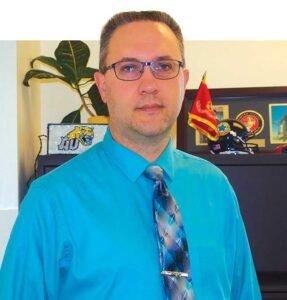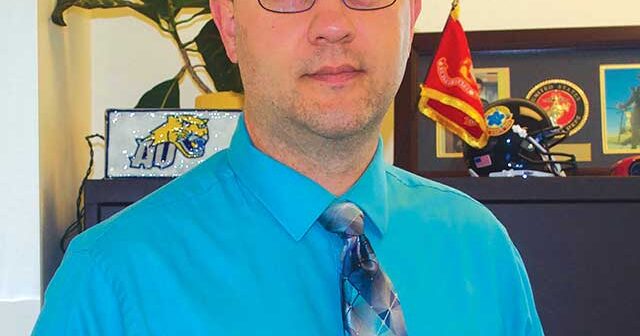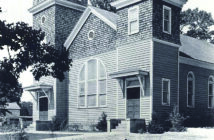Chester resident and 20-year Marine Corps veteran, James Wilson, last year was challenged by his military friends to participate, which promoted awareness for veteran suicide prevention. After Wilson participated, however, he felt like there was more he could do so he took it further by donating 22 hours of his time over 22 days to helping veterans.
“I was still kind of aimless, just felt like there was something more that could be done so I went to the VA hospital and sat down with some of the older veterans that were sitting there that didn’t seem to have anybody around and just talked to them,” Wilson said. “You could see the look in their eyes that, Wow, somebody out of the blue sat down and talked to me for an hour or two, and I don’t know if that made a difference or not but I felt better about that than I did doing pushups; to me, it felt like it was more productive.”
Around the same time Wilson was volunteering with veterans, he heard a song called “Do Something” by Matthew West, which further inspired him and eventually led him to REBOOT Combat Recovery.
“I’d heard a song by Matthew West called ‘Do Something’ … [and]the first part of the lyrics, the guy’s complaining about everything going on in the world and he raised his fist to heaven and said ‘God, why don’t you do something?’ and … God said ‘I did, I created you’ and that just hit me, I’m like ‘Wow, okay God, then what do you want me to do?’” Wilson said. “And about that same time, an older lady from our church said she’d seen something about the PTSD treatment program online … so she told me about REBOOT and I went home and started digging into it.”
The cis a 501(c)(3) non-profit organization and its mission is to help combat veterans and their families heal from the spiritual and moral injuries of war associated with post-traumatic stress and combat trauma. It was started in 2011 (by occupational therapist Jenny Owens and her husband, Evan) as a vessel to change the way combat trauma is treated from an experiential standpoint as opposed to academic. It currently has more than 50 locations across 23 states and more on the way.
The REBOOT Combat Recovery course is a 12-week program that helps neighboring veterans and first responders, and topics covered during the course include A Wounded Soul, The Roots of Trauma, Depression and Suicide, and Going Through the Valley (Moving Forward).
During his research, Wilson found out the REBOOT Combat Recovery program has zero suicides by program graduates, and since his objective was to
reduce the number of suicides in veterans, he made inquiries into bringing the program to Chester. After receiving a grant from REBOOT, Wilson advertised via Facebook, business cards, and word of mouth, which resulted in his first course at Ironbridge Baptist Church (on Monday nights). Wilson’s course ran from January to April, and nine participants graduated from the program.

James Wilson brought the Reboot program to chester, a 12-week program Combat Recovery course that helps neighboring veterans and first responders and in includes courses such as a Wounded Soul, The Roots of Trauma, Depression and Suicide, and Going Through the Valley (Moving Forward).
Wilson said the course is Christ-focused healing, and it allowed him and his students to heal and release trauma they’d never spoken about.
“Throughout the whole thing, we learn about what the trauma has done to us mentally and spiritually and how we can acknowledge that and grow and heal from it, and how we can lean on each other when we need support,” Wilson said. “It just really gave us an opportunity to express ourselves and get things out, things that had been bottled for a long time, and it was a good healing, it brought the nine of us closer together.”
Wilson said the course also helped him to deal with his own issues and that he likes the family-oriented nature of REBOOT.
“Unlike some of the other PTSD programs I’ve been through, this one is family-oriented so our wives and family members can be there, and so I was able to open up and share some things. I think my wife learned some things about me, I learned some things about me, as well as some of the other guys,” Wilson said. “Some of the spouses’ eyes when they heard what their spouse had to say are like ‘Wow, you’ve been carrying that for so long,’ and it was like a weight was lifted off, it was like ‘Wow, I’m free.’ Completely healed? Probably not, [but]definitely a lot better off and moving in the right direction.”
In addition to the low suicide rates of its graduates, there is a 78 percent graduation rate from the course and 47 percent of graduates become REBOOT leaders, to which Wilson can attest, as graduates of his course have already volunteered to help with and co-teach the next course (it starts September 11).
Wilson said he plans on being involved with REBOOT for a while and continuing to teach in the area. He hopes to eventually have more than one teacher so there can be multiple groups.
“For me, being able to share that with my wife was a key factor, but also … seeing the change in some of the guys that I met for the first time at the beginning of the year, and now I see them, I can tell there’s a little pep in their step, they’ve got a little twinkle of a smile,” Wilson said. “They just look happier, and to me that’s awesome. I had a small part in that, and that just made it worth it to me, and if I can help someone else, the more we can help, the better it would be.”
To learn more about the organization, or find a course near you, visit: rebootrecovery.com.


